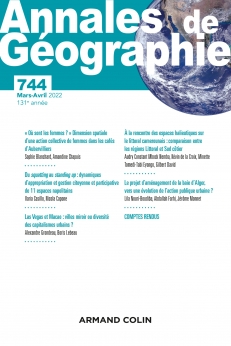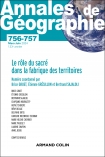
ANNALES DE GÉOGRAPHIE - N° 744 (2/2022)
Pour acheter ce numéro, contactez-nous
Recevez les numéros de l'année en cours et accédez à l'intégralité des articles en ligne.
À Alger, les nombreux dysfonctionnements urbains ont poussé les pouvoirs publics à engager dans les années 2000 de profonds changements de leurs modes de production urbaine. Ils ont choisi de recourir à l’expertise d’une ingénierie étrangère pour, d’une part, définir des projets urbains qui rayonneraient à l’échelle internationale, et d’autre part, faire évoluer les structures publiques locales de production urbaine. Selon nombre de chercheurs, le recours aux savoir-faire des professionnels transnationaux de la ville participe à la transposition de « méthodes-types » d’un lieu à un autre, indépendamment du contexte local. Le cas du projet d’aménagement de la baie d’Alger en est un bon exemple : le montage opérationnel revendiqué par les concepteurs transnationaux du projet s’est très vite heurté à des rigidités administratives locales. Des adaptations des mesures proposées par rapport aux exigences des acteurs urbains locaux ont été entreprises et via la construction de consensus lors du passage de la conception à la réalisation du projet. L’objectif de cet article est de renseigner les transformations de la production urbaine algéroise, induites par l’intégration d’acteurs transnationaux, à travers l’analyse du montage et du pilotage du projet d’aménagement de la baie d’Alger.
In Algiers, the numerous urban dysfunctions observed in the 1990s and 2000s have led the public authorities to undertake profound changes in their urban production methods. They chose to resort to the expertise of foreign urban engineering to define projects which would have an international influence and to make local public structures evolve towards better quality of urban production. According to many researchers, the use of the know-how of transnational urban professionals contributes to the transposition of “standard methods” from one place to another, independently of the local context. The case of the Bay of Algiers project is a good example: the operational set-up claimed by the transnational designers of the project very quickly came up against local administrative rigidities. Consensus on the adaptation of the proposed measures will be reached as the project moves from design to implementation. The aim of this article is to highlight the transformations of Algerian urban production induced by the integration of transnational actors, through the analysis of the management of the Bay of Algiers project.
